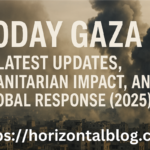overview
The ongoing Gaza conflict has UN Response to Gaza War drawn intense global scrutiny. Among the key international actors responding to the crisis is the United Nations (UN). As the conflict escalates, questions arise: What is the UN doing about the war in Gaza? How effective is its response? What impact does it have on the ground?
In this article, we dive deep into the UN response to the Gaza war, exploring resolutions, humanitarian aid, peacekeeping efforts, criticisms, and what lies ahead. This content is optimized to offer readers a complete, updated, and factual overview, aligning with what searchers are actively looking for.
Background of the Gaza War
The Gaza war, part of the decades-long Israel-Palestine conflict, has intensified in recent years, particularly since the 2023–2024 escalation involving Hamas attacks on Israel and subsequent Israeli military operations in Gaza.
Thousands have been killed, tens of thousands displaced, and critical infrastructure destroyed. The humanitarian toll has drawn condemnation and urgent calls for intervention from the international community—including the United Nations.
What Is the UN’s Role in International Conflicts?
The United Nations was founded in 1945 with a mission to maintain international peace and security. It acts through various bodies, such as:
- UN Security Council (UNSC): Handles peace and security issues. Has the power to impose sanctions, authorize force, or deploy peacekeepers.
- UN General Assembly (UNGA): Represents all 193 member states. Resolutions are non-binding but carry symbolic weight.
- UN Agencies (e.g., UNRWA, OCHA, WHO): Provide humanitarian aid, food, shelter, medical services, and education in conflict zones.
The UN Charter emphasizes peaceful resolution of disputes, respect for sovereignty, and the protection of civilians during wartime.
UN Response to Gaza War: Key Actions Taken
1. UN General Assembly Resolutions
The UN General Assembly has passed multiple resolutions addressing:
- Immediate humanitarian ceasefire
- Protection of civilians
- Access to humanitarian aid
- Condemnation of violence from both sides
Example: In December 2023, the UNGA passed a resolution calling for a “sustained humanitarian truce”, supported by over 150 member states. Although non-binding, such resolutions reflect global consensus.
2. Security Council Meetings and Vetoes
The UN Security Council has held emergency meetings since the outbreak of violence. However, efforts to pass binding resolutions have often been blocked by vetoes, particularly from permanent members like the U.S. or Russia.
Example: A draft resolution calling for an immediate ceasefire was vetoed by the United States in November 2023, citing Israel’s right to self-defense.
This has led to criticism of the UNSC’s “paralysis” in the face of humanitarian crises.
3. Calls for Ceasefire
Multiple UN leaders, including the UN Secretary-General António Guterres, have publicly:
- Condemned civilian deaths
- Called for an immediate humanitarian ceasefire
- Demanded protection of UN workers and infrastructure
In October 2023, Guterres said, “The situation in Gaza is a humanitarian catastrophe. The violence must stop. Now.”
4. UNRWA’s Humanitarian Relief Efforts
The United Nations Relief and Works Agency (UNRWA) is central to the UN’s Gaza response. Despite major challenges, it has:
- Provided shelter to over 1 million displaced Gazans
- Delivered food, water, and medical supplies
- Operated emergency health clinics
- Reported over 150 of its workers killed in conflict zones (as of early 2024)
UNRWA operates under extreme conditions, often amidst bombardment and fuel shortages.
Challenges Facing the UN Response
1. Political Divisions Among Member States
The UN is not a monolith—its members have vastly different political agendas. Disagreements, especially in the Security Council, weaken unified action.
2. Operational Risks on the Ground
Delivering aid in Gaza is dangerous and restricted. Bombings, fuel blockades, and lack of safe corridors impede UN relief operations.
3. Funding Shortfalls
Many UN agencies, particularly UNRWA, rely on voluntary contributions. In 2024, some key donor nations paused funding due to allegations of misconduct, crippling aid efforts.
4. Misinformation and Media Warfare
The UN faces attacks from both pro-Israel and pro-Palestine sides, accusing it of bias. Social media amplifies these narratives, often without context.
International Reactions and Collaborations
The UN doesn’t act alone. Its response is often amplified by partnerships with:
- Red Cross and Red Crescent Societies
- World Food Programme (WFP)
- World Health Organization (WHO)
- NGOs and civil society groups
Several countries have also pledged support for UN-led missions. For instance, Qatar, Norway, and Turkey have supported diplomatic channels to mediate ceasefire talks under the UN framework.
Criticism of the UN’s Response
Despite its efforts, the UN has faced criticism from multiple fronts:
- Ineffectiveness: Critics argue the UN has been unable to stop the violence or hold violators accountable.
- Bias Accusations: Israel and its allies claim the UN disproportionately targets Israel. Meanwhile, Palestinian supporters accuse it of not doing enough.
- Delays in Response: Some argue the UN’s bureaucracy slows urgent action during crisis moments.
However, others argue the UN remains one of the few neutral players able to deliver aid and facilitate dialogue.
What Could the UN Do Next?
Moving forward, the UN could:
1. Push for a Peacekeeping Mandate
Though unlikely due to vetoes, a UN peacekeeping mission could help protect civilians and aid deliveries.
2. Strengthen Humanitarian Corridors
The UN can pressure parties to allow safe zones and aid corridors, with the support of international observers.
3. Investigate War Crimes
Through the International Criminal Court (ICC) and UN Human Rights Council, investigations into potential war crimes or violations of international law could be pursued.
4. Advocate for Long-Term Peace Solutions
Beyond ceasefires, the UN could revive dialogue on a two-state solution, alongside global partners.
Conclusion
The UN response to the Gaza war reflects both its strengths and limitations. While it’s one of the few international bodies actively involved in relief and diplomacy, it struggles with internal politics, limited enforcement powers, and growing distrust from parties on the ground.
Still, its work—especially through agencies like UNRWA—remains vital for millions of civilians caught in the crossfire. As the conflict continues, the UN’s future role will depend on member-state cooperation, global pressure, and a renewed commitment to peace.
FAQs
What has the UN said about the Gaza war?
The UN has called for immediate ceasefires, protection of civilians, and unhindered humanitarian access. The Secretary-General and other officials have labeled the situation a humanitarian catastrophe.
Has the UN taken action against Israel or Hamas?
The UN has issued resolutions and statements condemning violence from both sides. However, binding actions have been blocked due to Security Council vetoes.
What is UNRWA and what does it do in Gaza?
UNRWA (United Nations Relief and Works Agency) provides education, healthcare, food, shelter, and emergency aid to Palestinian refugees, including in Gaza.
Why is the UN criticized over the Gaza conflict?
Critics cite inaction, bias, bureaucracy, and lack of enforcement power as key failings. Others argue the UN remains the only global actor attempting to mediate neutrally.
Can the UN stop the war in Gaza?
Not directly. The UN can influence global opinion, provide aid, and support peace talks, but without cooperation from key parties, its powers are limited.



